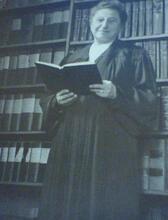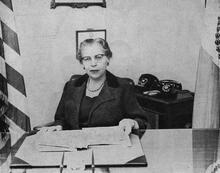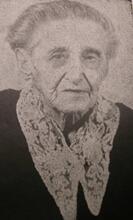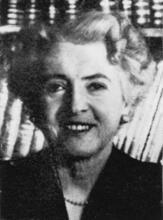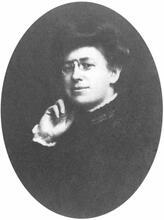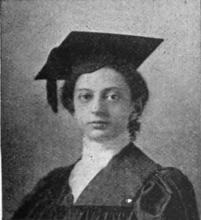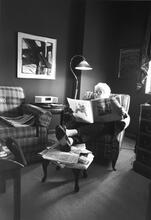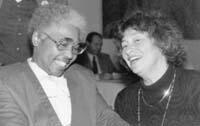Susan Brandeis Gilbert
The daughter of Supreme Court Justice Louis D. Brandeis, Susan Brandeis Gilbert became one of the first women attorneys to argue a case before the Supreme Court. Early in her career, she earned recognition for her prosecution of the Trenton Pottery antitrust case. To avoid conflict of interest in their shared field, Justice Brandeis arranged to be transferred from oversight of the Second Circuit and recused himself from a case Gilbert argued before the Supreme Court. From 1935 to 1949, Gilbert served on the New York State Board of Regents. When Brandeis University was founded in 1949, she became closely involved in its development, serving as honorary president of its National Women’s Committee and becoming a fellow of the university in 1952.
Background
On June 5, 1916, Susan Brandeis, a University of Chicago Law School student, watched her father, Louis Dembitz Brandeis (1856–1941)—a Harvard Law School graduate, millionaire, socially conscious Boston lawyer—take the oath of office as an associate justice of the United States Supreme Court. He was the first Jewish associate justice of the Court, and Susan would soon be the first woman lawyer whose parent sat on that bench.
Family and Education
Louis Brandeis and his wife, Alice Goldmark Brandeis, were second cousins born to German Jewish emigrés. The Brandeises were nonobservant Jews. Louis’s only connection with Jewish life in his youth was through his maternal uncle, Louis Dembitz. Alice Brandeis gave birth to Susan in Boston on February 27, 1893, and to her sister Elizabeth on April 25, 1896. Her mother never fully recovered her physical and psychic energy after Elizabeth’s birth. For a while, her maternal aunt, Josephine Goldmark, came to help the family. Her father directed the household and the raising of his daughters. They took their mother’s place as his companions during his regular outdoor activities. His intellectual influence was also profound: Susan became a lawyer, while Elizabeth became an economics professor at the University of Wisconsin.
In looks, inner drive, vigor, and political and social skills, Gilbert took after her father. In her lifelong lack of interest in cooking and clothes, she resembled her mother. Her social consciousness, morals, and social values were a legacy of both her parents. To her, literature, law, and causes for human equality were always more important than material possessions.
Gilbert was educated at Boston’s Winsor School, Bryn Mawr College (BA, 1915), and the University of Chicago Law School (LLB, 1919). In 1916, she worked for woman suffrage in Boston.
New York City became her home in 1921. The Brandeis family spent their summers together at the family home in Chatham, Massachusetts, where they boated and swam daily. Although Louis and Alice Brandeis lived frugally, they were important philanthropists supporting Hadassah, Zionism, and the University of Kentucky.
Legal Career
Admitted to the New York bar in 1921, no law firm would hire her because she was a woman, an event Susan Gilbert remembered all her life. That her father sat on the United States Supreme Court made no difference. Gilbert was appointed special assistant to the United States attorney in New York City. She prosecuted the Trenton Pottery antitrust suit. Shortly thereafter, she went into private practice with Samuel Rosenman. When she came before the Supreme Court to argue a case, Louis Brandeis removed himself from the bench to avoid a conflict of interest. Gilbert lost the case.
She met Jacob Gilbert, who was the opposing attorney in a minor landlord-tenant case. The couple married on December 22, 1925, at the New York Ethical Culture Society, and had three children: Louis (b. 1926), Alice (b. 1928), and Frank (b. 1930). Some traditional Jewish practices now became a part of Susan Gilbert’s life. In 1939, she and her husband established the law firm of Gilbert and Brandeis.
A very private woman, Gilbert compartmentalized her life. Many people knew some of her activities, but few people knew all of them. She was the second woman member of the New York State Board of Regents appointed by Governor Herbert Lehman, serving in that post from 1935 to 1949. She was also an active member of the Bar Association of New York City, Hadassah, the Women’s City Club, and the Democratic Party.
When Brandeis University was founded in Waltham, Massachusetts, in 1949, Susan and Jacob Gilbert were deeply involved in its development. She became the honorary national president of its National Women’s Committee, was made fellow of the university in 1952, and was awarded a doctor of humane letters in 1963.
Her husband, Jacob, died on April 8, 1966. Susan Gilbert suffered a stroke several years before her death on October 8, 1975. After funeral services in Temple Rodeph Sholom she was buried in Union Fields Cemetery, Queens, New York. Their three children survived them. Alice Popkins is a third-generation lawyer, Frank is with the National Trust for Historical Preservation, and Louis is a researcher.
AJYB 77:594.
Gilbert, Frank Brandeis, and Alice Brandeis Gilbert Popkin. Interviews by author, May 1996.
NYTimes, October 9, 1975, 44:1.
Strum, Philippa. Louis Brandeis (1984).
Thomas, Dorothy. Women Lawyers in the United States (1957).

